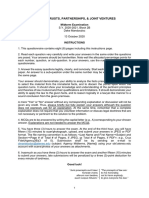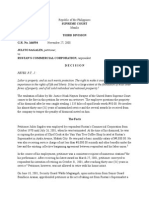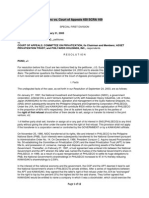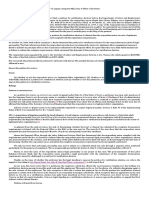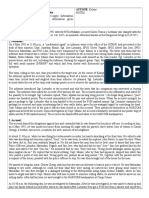0 ratings0% found this document useful (0 votes)
55 viewsSps Tinio Vs Manzano
Sps Tinio Vs Manzano
Uploaded by
FranzMordeno1) The petitioners admitted at the pre-trial that the private respondent was a co-owner of the disputed land along with her siblings and that her siblings sold their shares to the petitioner.
2) The petitioners argued at the trial court that the private respondent's right of legal redemption had lapsed, but then tried to argue on appeal that the land was public land, which was not raised at the pre-trial.
3) The Supreme Court held that the petitioners were bound by the theory and issues they raised at the pre-trial and could not raise new issues on appeal, as that would be unfair and against the purpose of pre-trials to clarify issues before trial.
Copyright:
© All Rights Reserved
Available Formats
Download as DOCX, PDF, TXT or read online from Scribd
Sps Tinio Vs Manzano
Sps Tinio Vs Manzano
Uploaded by
FranzMordeno0 ratings0% found this document useful (0 votes)
55 views1 page1) The petitioners admitted at the pre-trial that the private respondent was a co-owner of the disputed land along with her siblings and that her siblings sold their shares to the petitioner.
2) The petitioners argued at the trial court that the private respondent's right of legal redemption had lapsed, but then tried to argue on appeal that the land was public land, which was not raised at the pre-trial.
3) The Supreme Court held that the petitioners were bound by the theory and issues they raised at the pre-trial and could not raise new issues on appeal, as that would be unfair and against the purpose of pre-trials to clarify issues before trial.
Original Description:
remedial
Original Title
62. Sps Tinio vs Manzano
Copyright
© © All Rights Reserved
Available Formats
DOCX, PDF, TXT or read online from Scribd
Share this document
Did you find this document useful?
Is this content inappropriate?
1) The petitioners admitted at the pre-trial that the private respondent was a co-owner of the disputed land along with her siblings and that her siblings sold their shares to the petitioner.
2) The petitioners argued at the trial court that the private respondent's right of legal redemption had lapsed, but then tried to argue on appeal that the land was public land, which was not raised at the pre-trial.
3) The Supreme Court held that the petitioners were bound by the theory and issues they raised at the pre-trial and could not raise new issues on appeal, as that would be unfair and against the purpose of pre-trials to clarify issues before trial.
Copyright:
© All Rights Reserved
Available Formats
Download as DOCX, PDF, TXT or read online from Scribd
Download as docx, pdf, or txt
0 ratings0% found this document useful (0 votes)
55 views1 pageSps Tinio Vs Manzano
Sps Tinio Vs Manzano
Uploaded by
FranzMordeno1) The petitioners admitted at the pre-trial that the private respondent was a co-owner of the disputed land along with her siblings and that her siblings sold their shares to the petitioner.
2) The petitioners argued at the trial court that the private respondent's right of legal redemption had lapsed, but then tried to argue on appeal that the land was public land, which was not raised at the pre-trial.
3) The Supreme Court held that the petitioners were bound by the theory and issues they raised at the pre-trial and could not raise new issues on appeal, as that would be unfair and against the purpose of pre-trials to clarify issues before trial.
Copyright:
© All Rights Reserved
Available Formats
Download as DOCX, PDF, TXT or read online from Scribd
Download as docx, pdf, or txt
You are on page 1of 1
62. SPS TINIO VS MANZANO HELD: NO.
The applicable and well-settled principle is that
"a party is bound by the theory he adopts and by the cause
FACTS: of action he stands on and cannot be permitted after
having lost thereon to repudiate his theory and cause of
Private respondent Nelie Manzano is a co-owner of a
action and adopt another and seek to re-litigate the matter
parcel of land which her brother and sister’s sold the lot to
anew either in the same forum or on appeal."
spouses Amado and Milagros Tinio(spouse).
This is in essence putting petitioners in estoppel to
While the private respondent was abroad, her brother and question the judgment.
sisters sold the aforesaid property to petitioner Rolando
Tinio, the son of the other petitioners, spouses Amado and We note that at the pre-trial of the case, the parties agreed
Milagros Tinio with a forged “Affidavit of Waiver of Rights, among other matters that "the plaintiff is co-owner in
Claims and Interest” the respondent was made to appear equal shares with her brothers Ernesto Manzano & Roland
as having waived her rights. Manzano & sisters Pamela Manzano & Edna Manzano of
the properties enumerated in paragraph 2 of the 2nd
The disputed lot was successfully registered in the name of amended complainant"; & that "the co-owners of the
Rolando Tinio. plaintiff sold their share of the properties in favor of
Rolando Tinio."
Upon private respondent's return to the Philippines in Evidently, the petitioners having admitted that
1994, the plaintiff-appellee offered to redeem the shares of
her co-owners pursuant to Articles 1620 and 1621 of the 1. respondent Nellie Manzano along Manzano along
New Civil Code. with her brothers and sisters were co-owners of
the subject property,&
Receiving no reply, private respondent filed an action for 2. that the former acquired it by sale from the
legal redemption before the trial court. brothers & sisters, banked on the lapse of the
prescriptive period to exercise the right of legal
The Trial Court ruled in favor of the private respondent. redemption and the alleged knowledge and
Affirmed by the CA. participation by respondent Nellie Manzano in
the consummation of the sale including receipt of
Hence, petition for review. partial payment, as precluding her from
exercising said right.
Petitioner raised the following question, among others: Petitioners cannot now be allowed to escape the adverse
effects of their defense by belatedly raising a new theory
1. (has) decided question of substance not heretofore that the land is part of the public domain as this would be
been decided by the honorable supreme court and offensive to the fundamental tenets of fair play.
decided it on mere technicality by declaring that A pre-trial is meant to serve as a device to clarify and
petitioners could not raise the issue that there is no narrow down the basic issues between the parties, to
legal redemption over a land of the public domain ascertain the facts relative to those issues and to enable
because it was raised for the first time on appeal; the parties to obtain the fullest possible knowledge of the
Xxx xxx xxx issues and facts before civil trials and thus prevent that
said trial are carried on in the dark.
4. Gravely erred in ruling that the trial court had
jurisdiction over the subject land which under existing Pre-trial is primarily intended to make certain that all
jurisprudence lie within the exclusive authority of the issues necessary to the disposition of a case are properly
director of lands under the executive department. raised.
Thus, to obviate the element of surprise, parties are
expected to disclose at a pre-trial conference all issues of
ISSUE: W/N petitioner is allowed to escape the adverse law and fact which they intend to raise at the trial, except
effects of their defense by belatedly raising a new theory such as may involve privileged or impeaching matters.
that the land is part of the public domain?
The determination of issues at a pre-trial conference bars
the consideration of other questions on appeal.
You might also like
- Fink Remedies Fall 2013Document38 pagesFink Remedies Fall 2013Cameron DavidsonNo ratings yet
- Administrative Law Case Digests: Powers and Functions of Administrative AgenciesDocument8 pagesAdministrative Law Case Digests: Powers and Functions of Administrative AgenciesAizaFerrerEbina100% (1)
- Agency 2020 Mandocdoc MTDocument8 pagesAgency 2020 Mandocdoc MTclperryNo ratings yet
- Treaty Based MechanismsDocument9 pagesTreaty Based MechanismsSmriti PaudelNo ratings yet
- 7 - Panay Railways v. Heva - General PrinciplesDocument3 pages7 - Panay Railways v. Heva - General PrinciplesJosh PalomeraNo ratings yet
- Judge Marla O. Anderson: PERVERTED PRINCIPLES OF JUSTICE.Document30 pagesJudge Marla O. Anderson: PERVERTED PRINCIPLES OF JUSTICE.California CourtsNo ratings yet
- CLF 4 Lesson 5 - Works of Mercy and Cardinal VirtuesDocument49 pagesCLF 4 Lesson 5 - Works of Mercy and Cardinal VirtuesRafael A. SangradorNo ratings yet
- Stolt-Nielsen Vs MedequilloDocument11 pagesStolt-Nielsen Vs MedequilloJames Ibrahim AlihNo ratings yet
- Roberts v. CA G.R. No. 113930Document1 pageRoberts v. CA G.R. No. 113930JP Murao IIINo ratings yet
- Civil Procedure - Philippine Law ReviewersDocument108 pagesCivil Procedure - Philippine Law ReviewersEdgar Joshua TimbangNo ratings yet
- Labor Law Review - Melo M. Ponce de Leon: (SMA), Dated February 26, 2008Document9 pagesLabor Law Review - Melo M. Ponce de Leon: (SMA), Dated February 26, 2008Cj NightsirkNo ratings yet
- Case Digest - SEC Vs JalandoonDocument2 pagesCase Digest - SEC Vs JalandoonnsbambaoNo ratings yet
- 22 Sim Vs NLRCDocument1 page22 Sim Vs NLRCManz Edam C. JoverNo ratings yet
- Manila Water Co. v. Del RosarioDocument14 pagesManila Water Co. v. Del Rosariodos2reqjNo ratings yet
- 04 Roasters Vs GaviolaDocument4 pages04 Roasters Vs GaviolaRio100% (1)
- G.R. No. 170912Document12 pagesG.R. No. 170912Rene Valentos100% (1)
- Blue Bar Coconut vs. TantuicoDocument7 pagesBlue Bar Coconut vs. TantuicoEman EsmerNo ratings yet
- PMI Colleges V NLRCDocument7 pagesPMI Colleges V NLRCchavit321No ratings yet
- Legal Ethics March 2015Document7 pagesLegal Ethics March 2015fmquitcoNo ratings yet
- Commercial Law, Professors Sundiang and Aquino) : Common Form of Bill of ExchangeDocument11 pagesCommercial Law, Professors Sundiang and Aquino) : Common Form of Bill of ExchangeLizzy WayNo ratings yet
- Sagales Vs RustansDocument9 pagesSagales Vs RustansAnthony MedinaNo ratings yet
- Suyat Vs TorresDocument2 pagesSuyat Vs TorresChammyNo ratings yet
- Leo Echegaray, - Secretary of Justice, Et AL.,: en BancDocument41 pagesLeo Echegaray, - Secretary of Justice, Et AL.,: en BancGayle OmisolNo ratings yet
- Parageli Vs GMA July 13, 2020Document9 pagesParageli Vs GMA July 13, 2020Yam LicNo ratings yet
- Case Digests - Biz Org-6,12,18Document4 pagesCase Digests - Biz Org-6,12,18Louiegie Thomas San JuanNo ratings yet
- Maza Vs Sec GonzalesDocument4 pagesMaza Vs Sec GonzalesJames LanzarNo ratings yet
- Eman Recio VS Heirs of The Spouses AguedoDocument2 pagesEman Recio VS Heirs of The Spouses AguedoArvy AgustinNo ratings yet
- 2016.08 Case # 2 Dy Chiao v. BolivarDocument3 pages2016.08 Case # 2 Dy Chiao v. BolivarDee WhyNo ratings yet
- RULE 68 CompiledDocument19 pagesRULE 68 CompiledcH3RrY1007No ratings yet
- PIL - Supplementary CasesDocument9 pagesPIL - Supplementary CasesGem AusteroNo ratings yet
- Transfield Philippines Vs Luzon Hydro Electric CorpDocument5 pagesTransfield Philippines Vs Luzon Hydro Electric CorpSalma GurarNo ratings yet
- Makati Leasing Vs WeaverDocument1 pageMakati Leasing Vs WeaverSolomon Malinias BugatanNo ratings yet
- Almeda vs. Bathala Marketing IndustriesDocument6 pagesAlmeda vs. Bathala Marketing IndustriesMarife Tubilag ManejaNo ratings yet
- Abella-Jr-v-Civil-Service-Commission DigestDocument3 pagesAbella-Jr-v-Civil-Service-Commission DigestCamille Marie BristolNo ratings yet
- Assignement 3 - 10 Lucas v. LucasDocument5 pagesAssignement 3 - 10 Lucas v. LucaspatrickNo ratings yet
- EvidenceDocument4 pagesEvidenceSirci RamNo ratings yet
- Samahan vs. BLR Case DigestDocument4 pagesSamahan vs. BLR Case DigestBayoyoy NaragasNo ratings yet
- Abubakar Afdal vs. Romeo CarlosDocument3 pagesAbubakar Afdal vs. Romeo CarlosTeoti Navarro ReyesNo ratings yet
- In Re - CunananDocument52 pagesIn Re - CunananJasmin ApostolesNo ratings yet
- PIL REVIEWER BERNAS Chapter 2Document2 pagesPIL REVIEWER BERNAS Chapter 2DreiNo ratings yet
- RULE 13 Two ColumnsDocument17 pagesRULE 13 Two ColumnsAnonymous jUM6bMUuRNo ratings yet
- Capricorn Travel and Tours v. CADocument2 pagesCapricorn Travel and Tours v. CAKara SolidumNo ratings yet
- Cortes v. Catral (1997)Document2 pagesCortes v. Catral (1997)Junmer OrtizNo ratings yet
- Labor 1 ReviewerDocument39 pagesLabor 1 ReviewerBeatta RamirezNo ratings yet
- DBT Mar BayDocument2 pagesDBT Mar BayJoannaNo ratings yet
- Bandillon V LFUC - CorpinDocument3 pagesBandillon V LFUC - CorpinAndrew GallardoNo ratings yet
- 186 - Ang V ChinatrustDocument2 pages186 - Ang V ChinatrustCelest AtasNo ratings yet
- Civpro Notes - MidtermsDocument56 pagesCivpro Notes - MidtermsIrish MartinezNo ratings yet
- Libarios vs. DabalosDocument6 pagesLibarios vs. DabalosAdrianne BenignoNo ratings yet
- J.G. Summit Holdings Inc vs. Court of Appeals 450 SCRA 169Document12 pagesJ.G. Summit Holdings Inc vs. Court of Appeals 450 SCRA 169morningmindsetNo ratings yet
- City of Lapu-Lapu vs. Peza NOVEMBER 26, 2014Document27 pagesCity of Lapu-Lapu vs. Peza NOVEMBER 26, 2014nathalie kiezNo ratings yet
- RN Development Corporation Vs AII System Inc.Document1 pageRN Development Corporation Vs AII System Inc.John Henry ValenciaNo ratings yet
- Labor Casedigest1Document46 pagesLabor Casedigest1Zee CoelhoNo ratings yet
- LTD 4Document9 pagesLTD 4Khenlie VillaceranNo ratings yet
- Credit Midterms ReviewerDocument83 pagesCredit Midterms Reviewermelaniem_1No ratings yet
- Facts:: San Miguel Foods, Inc.-Cebu B-Meg Feed Plant v. LaguesmaDocument1 pageFacts:: San Miguel Foods, Inc.-Cebu B-Meg Feed Plant v. LaguesmaCuddlyNo ratings yet
- City Government of Caloocan vs. Carmel Development Inc. - 240255Document18 pagesCity Government of Caloocan vs. Carmel Development Inc. - 240255prettorneyNo ratings yet
- Research On PreTrialDocument3 pagesResearch On PreTrialCzarina RubicaNo ratings yet
- Concept, Types, Characteristics and ClassificationsDocument6 pagesConcept, Types, Characteristics and ClassificationsCJ FaNo ratings yet
- De GuzmanDocument3 pagesDe GuzmanMama MiaNo ratings yet
- LBP Vs EscandorDocument5 pagesLBP Vs EscandorSugar Fructose GalactoseNo ratings yet
- Albano QuestionnairesDocument4 pagesAlbano QuestionnairesRonn SopsopNo ratings yet
- 014 Page 437 Sps. Tinio vs. Manzano Pre TrialDocument2 pages014 Page 437 Sps. Tinio vs. Manzano Pre TrialNafiesa ImlaniNo ratings yet
- Pioneer Insurance - Surety Corp. v. Court of AppealsDocument2 pagesPioneer Insurance - Surety Corp. v. Court of AppealsFranzMordeno100% (1)
- Extrajudicial Partition of Real EstateDocument2 pagesExtrajudicial Partition of Real EstateFranzMordenoNo ratings yet
- Bill of ExchangeDocument1 pageBill of ExchangeFranzMordenoNo ratings yet
- Tocao v. Court of AppealsDocument2 pagesTocao v. Court of AppealsFranzMordenoNo ratings yet
- Lim Tong Lim v. Philippine Fishing Gear IndustriesDocument2 pagesLim Tong Lim v. Philippine Fishing Gear IndustriesFranzMordenoNo ratings yet
- Rojas vs. MaglanaDocument2 pagesRojas vs. MaglanaFranzMordenoNo ratings yet
- Heirs of Jose Lim vs. Lim 614 Scra 141, March 03, 2010Document3 pagesHeirs of Jose Lim vs. Lim 614 Scra 141, March 03, 2010FranzMordenoNo ratings yet
- Lyons vs. Rosenstock 56 Phil. 632, March 17, 1932Document2 pagesLyons vs. Rosenstock 56 Phil. 632, March 17, 1932FranzMordenoNo ratings yet
- Villareal vs. Ramirez 406 Scra 145, July 14, 2003Document2 pagesVillareal vs. Ramirez 406 Scra 145, July 14, 2003FranzMordenoNo ratings yet
- 15.BMacdonald Vs National City Bank of New York DigestDocument1 page15.BMacdonald Vs National City Bank of New York DigestFranzMordenoNo ratings yet
- Ortega v. Ca 245 Scra 529 (1995)Document4 pagesOrtega v. Ca 245 Scra 529 (1995)FranzMordenoNo ratings yet
- Tocao v. Ca 342 Scra 20 (2000)Document8 pagesTocao v. Ca 342 Scra 20 (2000)FranzMordenoNo ratings yet
- United States vs. ClarinDocument1 pageUnited States vs. ClarinFranzMordenoNo ratings yet
- Ortega v. Court of AppealsDocument2 pagesOrtega v. Court of AppealsFranzMordenoNo ratings yet
- Tan Eng Kee v. Ca 341 Scra 740 (2000)Document9 pagesTan Eng Kee v. Ca 341 Scra 740 (2000)FranzMordenoNo ratings yet
- Campos Rueda Vs CirDocument1 pageCampos Rueda Vs CirFranzMordenoNo ratings yet
- Pioneer Insurance - Surety Co. v. Ca175 Scra 668 (1989)Document9 pagesPioneer Insurance - Surety Co. v. Ca175 Scra 668 (1989)FranzMordenoNo ratings yet
- Pascual vs. Cir 166 Scra 560Document5 pagesPascual vs. Cir 166 Scra 560FranzMordenoNo ratings yet
- Evangelista v. Cir 102 Phil 140 (1957)Document6 pagesEvangelista v. Cir 102 Phil 140 (1957)FranzMordenoNo ratings yet
- Under The Common Law RuleDocument10 pagesUnder The Common Law RuleEl-Seti Anu Ali El100% (1)
- DKC Holdings Corporation vs. Court of Appeals: 666 Supreme Court Reports AnnotatedDocument9 pagesDKC Holdings Corporation vs. Court of Appeals: 666 Supreme Court Reports AnnotatedHalin GayNo ratings yet
- Raja Nand Kumar CaseDocument14 pagesRaja Nand Kumar Casesufi9019No ratings yet
- Contract Project .OokkDocument14 pagesContract Project .OokkPriyal AgarawalNo ratings yet
- CASE DIGEST (New Code of Judicial Conduct) 2016-2017Document16 pagesCASE DIGEST (New Code of Judicial Conduct) 2016-2017DD CC100% (1)
- Transfer of A Case For A Reason of Engaging An AdvocateDocument7 pagesTransfer of A Case For A Reason of Engaging An AdvocateBenedict AnicetNo ratings yet
- Mercado v. EspirituDocument10 pagesMercado v. EspirituAnonymous eNHo872No ratings yet
- DPC Viva Expected QuestionsDocument11 pagesDPC Viva Expected Questionsharshithalaw1111No ratings yet
- The Transfer of JudgesDocument12 pagesThe Transfer of JudgesIshwar MeenaNo ratings yet
- In Re James Thomas and Linda Thomas, Debtors. Southtrust Bank of Alabama, N.A., As Assignee of Southtrust Mobile Services v. James Thomas and Linda Thomas, 883 F.2d 991, 11th Cir. (1989)Document12 pagesIn Re James Thomas and Linda Thomas, Debtors. Southtrust Bank of Alabama, N.A., As Assignee of Southtrust Mobile Services v. James Thomas and Linda Thomas, 883 F.2d 991, 11th Cir. (1989)Scribd Government DocsNo ratings yet
- Balemala vs. PolinarDocument2 pagesBalemala vs. PolinarRodel D. LuyaoNo ratings yet
- Astorga & Repol Law Offices vs. VillanuevaDocument38 pagesAstorga & Repol Law Offices vs. VillanuevaMP ManliclicNo ratings yet
- Fresh Files (Duty Judge)Document53 pagesFresh Files (Duty Judge)Hassan SardarNo ratings yet
- DV Act Judgment Madras High CourtDocument60 pagesDV Act Judgment Madras High CourtVignesh MNo ratings yet
- USCOURTS Hid 1 - 12 CV 00048 0Document4 pagesUSCOURTS Hid 1 - 12 CV 00048 0Mike Las VegasNo ratings yet
- People vs. EnriquezDocument16 pagesPeople vs. EnriqueztheresagriggsNo ratings yet
- Case Digest Partial 2ndDocument11 pagesCase Digest Partial 2ndEduardNo ratings yet
- Sameer Overseas Placement Agency, Inc. v. SantosDocument2 pagesSameer Overseas Placement Agency, Inc. v. SantosKara SolidumNo ratings yet
- G.R. No. 199975Document40 pagesG.R. No. 199975Sheryl VelascoNo ratings yet
- Summary of CPC Case Material Cases 1-21 PDFDocument76 pagesSummary of CPC Case Material Cases 1-21 PDFShiva NarangNo ratings yet
- De Leon Vs Molo-PecksonDocument6 pagesDe Leon Vs Molo-PecksonGigiRuizTicarNo ratings yet
- 164 People vs. TrancaDocument3 pages164 People vs. TrancaKelsey Olivar MendozaNo ratings yet
- Neplum Inc Vs OrbesoDocument12 pagesNeplum Inc Vs OrbesoKristine KristineeeNo ratings yet
- Caltex v. Palomar, L-19650, September 29, 1966Document6 pagesCaltex v. Palomar, L-19650, September 29, 1966Angelica SolisNo ratings yet
- Obstruction of Justice DetailedDocument89 pagesObstruction of Justice DetailedSeamusWinstonNo ratings yet
- Notice of AppealDocument3 pagesNotice of AppealakosierikaNo ratings yet
- Kerajaan Negeri Johor & Anor v. Adong Kuwau & Ors: CIVIL PROCEDURE: Costs - Getting-Up Fee - Award by RegistrarDocument9 pagesKerajaan Negeri Johor & Anor v. Adong Kuwau & Ors: CIVIL PROCEDURE: Costs - Getting-Up Fee - Award by RegistrarAlae KieferNo ratings yet


